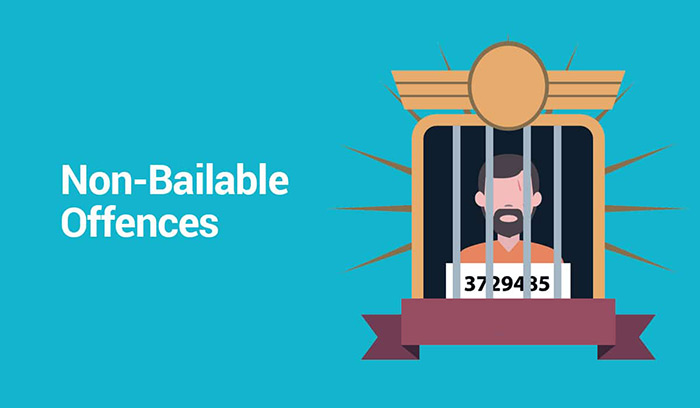Everyone is entitled to bail. Aren’t they? That’s the popular understanding and the 8th Amendment to the Constitution, which states clearly that “excessive bail shall not be required”, seems to drive home that point. After all, why mention bail at all if it’s not a fundamental right? While that seems like a logical conclusion a closer inspection of the 8th Amendment reveals the founders left plenty of room for interpretation in their wording. After all, it doesn’t say anywhere that “all suspects shall be offered bail”. Only that any bail that is offered can’t be excessive. As a result, people are often shocked to learn they have been deemed ineligible for bail and that they’ll have to remain in custody until trial.

Bail Bonds Don’t Apply to Non-Bailable Offenses
While the Constitution suggests everyone is entitled to bail the reality is actually quite different. In fact it’s quite common for people to be denied bail and held pending their trial date. Some of the conditions that might result in a person being denied bail are:
- The person is accused of committing a crime while out on bail for a previous offense.
- The person has jumped bail in the past.
- The person may have assaulted police officers during the course of their arrest.
- The person may have demonstrated contempt of court during their bail hearing.
- The person may be a resident of a foreign country or in the United States illegally.
- The person may be deemed a threat to public safety.
- The person may have committed a non-bailable offense.
With the first 6 items on that list the judge has the authority to either grant or deny bail based on their reading of the situation. (Even illegal aliens can obtain an “immigration bond” in some cases.) The last item on the list however leaves no room for debate or interpretation. If a person has committed a non-bailable offense even the most experienced bondsman in Denver isn’t going to gain their release.
What Constitutes a Non-Bailable Offense?
While there are some grey areas around the periphery of the term “non-bailable offense” - particularly as you move from state to state - there are certain crimes which will be ineligible for bail regardless of whether a person is arrested in Adams County, Broomfield County, Weld County or anywhere else in Colorado or most other states. These generally agreed upon, non-bailable offenses include:
- Any offense that is punishable by death or life imprisonment.
- Terrorism or aiding and abetting terrorist activities.
- Murder or attempted murder.
- Drug trafficking (typically large scale drug trafficking).
- Sexual assault of a minor.
If the defendant has a prior history of being accused of crimes punishable by death or life imprisonment they may also be denied bail. In addition, if the person has 2 or more non-bailable offenses on their record they may be denied bail.
The Three-Strikes Conundrum
A major complication thrown into the non-bailable offense picture over the past 25 years has been the rise of so-called “three-strikes” laws. These laws, intended to deter repeat offenders, originated with the federal government and spread from state to state during the 1990s. The original impetus behind three-strikes was perhaps understandable. But they have had the unintended consequence of filling jails with people denied bail because they have been accused of a third drug offense. And under many three strikes laws a third offense carries a mandatory life sentence (see #1 on the above list of non-bailable offenses).
The thing is, that third strike may have been nothing more than being caught with a half-ounce of marijuana in their pocket. Certainly possession of such a small amount of marijuana - even in pre-legalization days - was never meant to be a non-bailable offense. But in the era of three strikes it has effectively become one in some circumstances and in some states (though not Colorado, which requires the three strikes to be violent offenses).
Enter the First Step Act
In December 2018 President Trump signed what is known as The First Step Act. This legislation received widespread support and is intended to reduce the prison population by, among other things, reducing sentences in some three-strikes cases from mandatory life imprisonment to 25 years.
While this may not seem like a big deal it actually is because it means, among other things, that those accused of third strike offenses may now be eligible to work with a bail bonding agent. That’s because the judge is no longer constrained in such cases by the dictum that any offense that carries a potential life sentence is non-bailable.
Where Do We Go From Here?
The history of non-bailable offenses is a rocky one. And, as demonstrated by the changing nature of three strikes laws, one that is more or less in a constant state of flux. Modern nation states have been reluctant to exercise pre-trial detention for any reason simply because doing so undermines the presumption of innocence.
Yet it is clearly in the public interest that certain people accused of certain crimes, or with a history of being accused of certain crimes, not be released until their guilt or innocence has been established by trial. So a fine line needs to be walked that takes the rights of the accused into consideration but also doesn’t ignore legitimate public safety concerns. Call Rapid Release Bail Bonds to learn more.